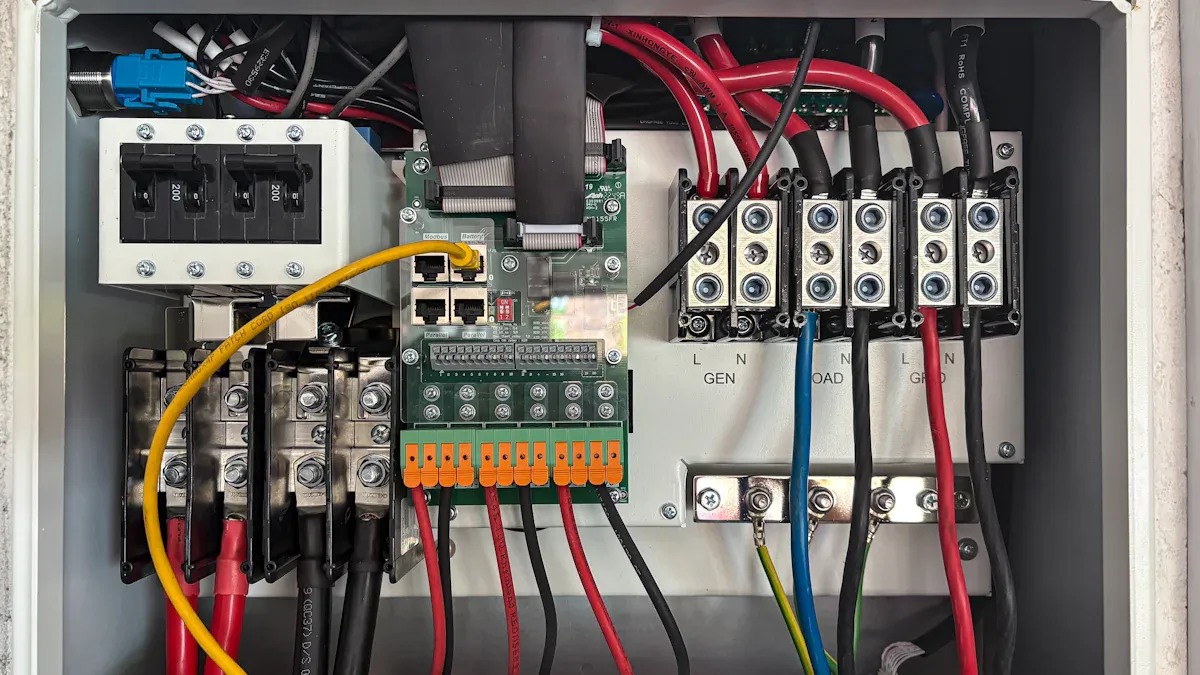You can extend the service life of circuit breakers by adopting simple habits. Circuit breakers that are well-maintained protect your home or building effectively. They respond quickly to electrical hazards. Regular maintenance helps you prevent unexpected issues and costly repairs.
Taking action now ensures your electrical system remains safe. It also aids in reducing your repair expenses.
Key Takeaways
- Check your circuit breakers often to find problems early. Look for damage, rust, or loose wires every year.
- Keep your electrical panel clean and dry. Dust and water can make it too hot or break it. Use safe ways to clean it.
- Do not put too much power on your circuit breakers. Learn the power limits and watch for signs of overload. This helps stop damage and keeps you safe.
Inspections
Checking your circuit breakers often helps you find problems early. This keeps your electrical system safe and working well. When you test circuit breakers, you can spot wear or if something is wrong. Doing this stops power loss and keeps your breakers ready for trouble. For example, a big utility company in the U.S. stopped a blackout for over 500,000 people. They found and fixed a worn breaker during a normal check. You can keep your home or building safe like this too.
Inspection steps
How often you check depends on where you are. The table below shows how often experts say to check circuit breakers:
| Setting Type | Recommended Frequency |
|---|---|
| Residential | Once or twice a year |
| Commercial/Industrial | Every six months or quarterly |
| High-dependency | Monthly or weekly |
Here are steps to follow each time you check:
- Turn off the main power before you begin.
- Look for damage, rust, or loose wires.
- Flip each breaker on and off to test it.
- Listen for any buzzing or crackling noises.
- If you see anything strange, call a licensed electrician.
Signs to watch
Look out for common problems when you check. The table below shows issues you might find:
| Issue Type | Description |
|---|---|
| Overloaded Circuits | Too many things use power at once, so the breaker trips. |
| Short Circuits | A hot wire touches a neutral wire, causing a big current and tripping. |
| Ground Faults | A hot wire touches a grounded surface, which can shock you. |
Tip: Finding these problems early helps your circuit breaker last longer and saves money on repairs. You make things safer and more reliable by acting fast.
If your breaker keeps tripping or gets too hot, get help from a professional. Checking your breakers often is important for making them last longer.
Clean and dry panel

Prevent dust and moisture
It is important to keep your electrical panel clean and dry. This helps protect your circuit breakers. Dust and moisture can cause many problems inside the panel. Dust can block airflow and trap heat. Moisture can cause rust and short circuits. The table below shows some risks from dust and moisture:
| Risk Type | Explanation |
|---|---|
| Corrosion of Electrical Contacts | Moisture causes rust. This makes contacts fail. |
| Dielectric Breakdown and Flashovers | Moisture lowers insulation. Arcs can form and break equipment. |
| Reduction in Insulation Resistance | Lower insulation can make equipment stop working. It can also be unsafe. |
| Creation of Conductive Paths | Dust and moisture can make paths for electricity. This can cause leaks and make systems unstable. |
| Overheating Due to Poor Ventilation | Dust blocks air. This makes hot spots and damages insulation. |
| Formation of Sludge | Dust and moisture mix to make sludge. Sludge can rust parts and block electric paths. |
High humidity can make water drops inside the panel. This causes rust and weakens metal parts. Moisture can bring dirt into the breaker. This makes it work less well. Keeping the panel clean and dry helps your circuit breakers last longer.
Cleaning tips
You should use safe ways to clean your panel. Always turn off the power before cleaning. Here are some good ways to clean your panel:
- Use a vacuum with plastic parts to pick up dust.
- Wipe surfaces with a damp rag and safe cleaner.
- Pick cleaners made for electrical equipment. These dry fast and do not leave anything behind.
- Do not use liquid cleaners unless the maker says it is okay.
- Do not use air to blow dust unless you know it is safe. Air can push dust deeper or cause problems.
Tip: Clean gently so you do not hurt wires or make new safety problems. Always follow safety rules for electricity.
A clean and dry panel helps your breakers work well and last longer.
Avoid overloads
It is important to not overload your circuit breakers. Overloads can hurt your electrical system. They also make your circuit breaker wear out faster. You can stop this by knowing how much power your circuit can take. Watch for signs that show there is a problem.
Circuit capacity
Each circuit breaker can only handle so much electricity. You need to know these limits to keep things safe. The table below shows how much power is safe for homes and businesses:
| Requirement | Amperage | Safety Limit (80%) | Maximum Wattage |
|---|---|---|---|
| Minimum for smaller homes | 100 amps | 1,440 watts | 1,800 watts |
| Minimum for larger homes | 200 amps | 1,920 watts | 2,400 watts |
| Dedicated circuit for high-wattage | N/A | N/A | 1,000 watts+ |
Here are some tips for using circuits:
- Use 14 gauge wire with a 15 amp breaker for lights.
- Use 12 gauge wire with a 20 amp breaker for outlets.
- Do not use more than 80% of a breaker’s power.
- Only put up to 10 outlets on one breaker.
If you want to add new devices, check your panel first. This helps you stop overloads and keeps your system safe.
Overload signs
You can find overloads by looking for these signs:
- Breakers trip often.
- Lights get dim or flicker.
- Outlets feel warm or look burned.
- You smell burning or see black marks near outlets.
- You hear buzzing, crackling, or popping sounds.
If you see any of these signs, unplug some things and call an electrician. Acting fast keeps your home safe and helps your circuit breaker last longer.
Exercise breakers
Manual operation
You can make your circuit breakers last longer by using them sometimes. This means you turn each breaker off and on by hand. Doing this stops the moving parts from getting stuck. It also lets you find problems early. If you do not use your breakers, you might have more wear and tear. You could lose sensitivity or have heat problems. These issues can make your breaker not work when you need it.
You should have a plan for when to use your breakers. The table below shows how often experts say to do this:
| Circuit Breaker Type | Maintenance Frequency |
|---|---|
| MCCBs | At least once a year, with trip tests every 3 to 5 years |
| LVPCBs | Check and maintain every 1 to 3 years, depending on how much you use them |
When you use your breakers, listen for weird sounds and check if they move easily. If you see or hear anything odd, call an expert. Using your breakers by hand often helps them last longer.
Safety tips
You need to be careful when working with circuit breakers. Always do these things:
- Turn off all power before touching anything.
- Wear safety gear to protect yourself from arc flash.
- Be careful with any part that could still be hot.
- Check all wires before turning the power back on.
- Use the right breaker for your wires and how much power you need.
- Never use a breaker with the wrong amperage.
- Remember, the main bus bar and wires coming in can still have power even if the main is off.
Tip: Safety is the most important thing. If you are not sure, ask a licensed electrician for help.
Tighten connections
Loose connections in your circuit breaker panel can be dangerous. They might cause too much heat, sparks, or even fires. Tightening connections lowers resistance. This stops heat from building up and keeps things safe. Checking your panel often helps you find problems early. You can use special tools like thermal imaging to spot loose places.
Check for wear
Look for signs of damage or heat every time you check. Watch out for these warning signs:
- Smells like something is burning near the panel.
- Circuit breakers trip a lot.
- Wires or breakers look burned or have dark marks.
- The breaker feels very hot when you touch it.
If you see any of these, act fast. Loose connections can make small areas get hot, start fires, break equipment, or cause legal trouble. The table below shows what can happen if you ignore loose connections:
| Consequence | Description |
|---|---|
| Localized heating | Loose connections make things hot and cause sparks. |
| Fire risks | Too much heat can start fires in wires or outlets. |
| Equipment damage | Broken parts can cost a lot to fix. |
| Liability issues | Unsafe panels can break rules and get you in trouble. |
Connection tips
You can tighten connections safely by doing these steps:
- Turn off the main breaker first.
- Take off the panel cover and stay away from hot spots.
- Use a tool with insulation to tighten screws.
- Put the cover back on and turn the power on.
Wear gloves and goggles for safety. Do not wear loose clothes or jewelry. Always make sure the power is off before you start. If you are not sure, call an electrician. These steps help your circuit breaker last longer and keep your home safe.
Improve service life of circuit breaker
Replace outdated units
Check how old your circuit breakers are. Old ones can last up to 40 years. Newer ones last about 30 years. AFCI or CAFCI breakers last 30 to 40 years, usually 35 years. If your breakers are getting old, think about getting new ones. Old breakers might not keep your home safe. They can stop working without warning.
When you get new breakers, do these things:
- Make sure the new breaker fits your system’s voltage and current.
- Use arc flash safety steps to stay safe.
- Follow all electrical codes for your area.
- Check the place where you will put the breaker.
- Plan safety steps before you begin.
Tip: Getting new breakers helps you stay safe and keeps your system working well.
Upgrade options
There are many ways to upgrade for better safety and saving energy. Energy-saving upgrades can lower your bills and help the planet. Smart circuit breakers let you see how much energy you use right away. You can add LED lights, smart thermostats, and energy-saving devices. Custom panels give you more circuits and new features. These upgrades help you use more power and make your home safer.
| Advancement Type | Description |
|---|---|
| Smart Technology | Lets you watch and control breakers for better safety and saving energy. |
| IoT Integration | Gives real-time checks and helps fix problems before they happen. |
| Electronic Trip Units | Lets you change settings and gives better protection. |
| Arc Extinguishing Technologies | Helps control arcs for different voltages. |
Hiring trained and insured workers makes sure upgrades are safe and work right. Upgrades cost more than just fixing things, but they help you avoid danger and make your circuit breakers last longer.
You can make things safer and save money with these five tips. If you take care of your circuit breakers, they work better. This helps stop problems before they happen.
| Strategy | Benefits |
|---|---|
| Preventive Maintenance | Fewer repairs, longer life, less downtime |
Always get help from experts for hard jobs. What you do now keeps your system safe later.
FAQ
How often should you check your circuit breakers?
You should inspect your circuit breakers at least once a year. If you see problems, check more often or call an electrician.
What signs show your breaker needs replacing?
Look for frequent tripping, burning smells, or visible damage. If you notice these, replace your breaker soon.
Can you clean your panel yourself?
You can clean dust with a vacuum and a dry cloth. Always turn off the power first. For deep cleaning, ask a professional.
See also
The service life of miniature circuit breakers
Can moisture cause circuit breakers to trip
What is the service life of a circuit breaker?
What Leads to RCCB Malfunction and Damage
Do I need to turn off the solar panels during cleaning?



